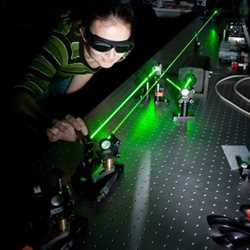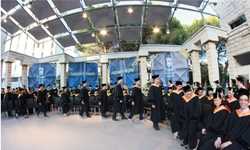
Technology forecasts for scientific and technological personnel needs
This study was conducted as part of a four-year tender for the National Council for Research and Development in the Ministry of Science and Technology. The objective of this study is to forecasts the needs of scientific and technological personnel for selected fields/professions for the short term (10 years).

Studies: Innovation – Environmental Technologies
Samuel Neaman Institute's publications indicate the necessary steps for the State of Israel to utilize the potential inherent in this market - both for improving the quality of life and the environment in Israel and for the opportunity to export knowledge and technologies and create jobs in the field. The works reflect the main trends in the world, map the uniqueness and relative advantage of the Israeli economy and shed light on the barriers facing entrepreneurs, investors and industries in Israel. In addition, the policy papers detail basic principles for designing a supportive policy.

The Role of Israeli Research Universities in the National R&D
This study was commissioned by the National Council for R&D (NCRD). Its purpose was to examine the influence of Israeli research universities on the national R&D system and the reciprocal relationships between the two systems in creating new knowledge and advanced technologies.

Mapping National Research Infrastructures
The purpose of the research is the mapping of the existing national research infrastructures and the definition of the needs of Israeli researchers with respect to the upgrade and establishment of new research infrastructures.

A Survey to Examine the Difficulties of Transmitting Nano Technologies from the Academe to the Industry
The TELEM Forum (National Infrastructure for Research and Development Forum), with the assistance of the National Committee for Nanotechnology (INNI( has worked during the last eight years to establish six research centers in the field of nanotechnology funded according to the matching method. The established research centers conducted thousands of studies based on nanotechnology, the effect of which has not yet realized its maximum potential.

Mapping National Research Infrastructures in Israel
The Samuel Neaman Institute is conducting in 2012-2014 a further study on the subject of ‘Mapping National Research Infrastructures in Israel’. The goal of the study is to build the knowledge database that would allow the creation of a road map for planning national research infrastructures in Israel and to formulate a policy that will define budgets and priorities within a national policy on large research infrastructures in Israel.
_20190307165359.710.png?w=250&quality=50)
Learning Infrastructures in the Field of Nanotechnology – EduNano TEMPUS
The EduNano project is part of TEMPUS, an EU program that supports the modernization of higher education in Eastern Europe, Central Asia, Western Balkans, North Africa, and the Middle East. SNI participates in the project together with the nano centers of the Israeli universities and Elbit Systems. In addition, the Technical University of Sofia in Bulgaria, the Polytechnic Institute of Turin in Italy, and the Grenoble Institute of Technology in France participate in the project.

Evaluation of the Space Industry's Impact on the Israeli Economy
This project is operating under the auspices of the S. Neaman Institute and the Economics of National Security (ENS) Research Program. Its goal is to map out the interconnections between Israel's academy, national defense system and industry in light of the country's growth in space industry and in space technology R&D.

Policy Incentives for Knowledge Creation
The project is implemented under the Seventh Program of the European Union (FP7), a consortium that consists of seven countries (Italy, Germany, France, Spain, Poland, the UK, and Israel). The purpose of the project is to examine empirically the role of the demand side in the creation of technological knowledge, recognition of technological and organizational innovation, and encouraging the increase in productivity. The project is formally complete and our contribution was expressed in five outputs.

Evaluation of the Technion Excellence Programs
The Technion Program for Excellence was launched in 1992 and is intended for undergraduate students in the Faculties of Science and Engineering who have been identified as having exceptional abilities.

Innovation in the Service Sector
This initiative by the Samuel Neaman Institute with joint funding of SNI and the Chief Scientist at the Ministry of Industry, Trade and Labor, is designed to examine innovation in the service sector for the first time in Israel.

Evaluating the "Rothschild Fellowship" Program
The main goal of the research was to evaluate the impact of the program on the candidates' careers and to assess their chances of pursuing academic careers in leading universities and research institutions in Israel. The research population included 359 candidates who applied to the program between 1996 and 2005. Three groups are included in the analysis: candidates who received the fellowship (Rothschild fellows), candidates who their application was turned down by the evaluation committee and candidates who chose to decline the fellowship.

Evaluating the NOFAR Program
The NOFAR program was conceived as part of the implementation of the recommendations made by the "Monitor Report," and stresses the need to establish a fund to support the development of inventions in the fields of biotechnology and nanotechnology that have a commercial potential in universities, so as to increase the chances of successful transfer of the technology from the academy to industry. The program helps build a bridge between the basic research and the applied research at the stage at which industry has not yet recognized the idea as having a commercial potential.

Evaluation of the Program Salary-Employment Advancement of New Immigrants
The current study was commissioned by the Ministry of Immigrant Absorption in cooperation with the Samuel Neaman Institute. The main goals of the research were: to identify the factors which affect the employment of immigrants at the conclusion of the period of assistance and in the course of time, examine the effect of running the program on the employment of new immigrants and formulate recommendations that could assist policy makers in improving the program.

Vouchers for New Immigrants as Tools for the Job Market
The current study was commissioned by the Ministry of Immigrant Absorption in cooperation with the S. Neaman Institute, and examined whether the Vouchers Project was effective in facilitating employment and in upgrading the status of jobs held by the immigrants upon graduation.

Evaluation of the MAGNETON Program
The evaluation of the Magneton program is a research initiated and funded by both the Samuel Neaman Institute and the MAGNET management. The research was performed during 2008-2009. The main research goal was to examine the outputs of the Magneton projects and their success while focusing on the characteristics of the projects, academic researchers and industry head of projects and to evaluate the factors impacting the projects' successes and failures in the past few years.